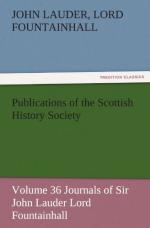The influence of Lander’s period of youthful travels, his Wanderjahre, on his future development is seen in various ways. He always kept up his interest in foreign countries and foreign literature. He bought a great many books, a list of which year by year is preserved, and he read them. The law manuscripts, though they embrace a pretty wide field, are confined to domestic affairs. But in the Observes there are every year notes and reflections on the events passing in every part of Europe, and especially France. There is some interest in the following passage, almost the last sentence in the Historical Observes, ’In regard the Duke of Brandenburgh and States of Holland have not roume in ther countries for all the fugitive Protestants, they are treating with Pen and other ouners of thesse countries of Pensylvania, Carolina, etc., to send over colonies ther; so that the purity of the Gospell decaying heir will in all probability passe over to America.’ The foreign schools of law where he had studied naturally affected his treatment of legal questions. Until the publication of the great work of Stair, the common civil law of Scotland was in a comparatively fluid state, though there were some legal treatises of authority, such as Craig’s Feudal Law. Mackenzie’s Criminalls was published in 1676, and is often referred to by Lauder. Many of his contemporaries at the bar had studied like himself in the foreign schools of the Roman Civil Law, and in his reports of cases the original sources are quoted with enviable familiarity and appositeness.
TORTURE, ASTROLOGY, AND WITCHCRAFT
In questions of social ethics, such as torture, and of popular belief, such as astrology and witchcraft, Lauder was not much in advance of his age. He frequently mentions the infliction of torture without any comment. When Spence and Carstairs were tortured with the thummikins, he describes them as ‘ane ingine but lately used with us,’ and possibly he had some misgiving. The subjects of astrology and witchcraft had an attraction for his inquiring and speculative mind.[26] He believed in the influence of the heavenly bodies, and more firmly in witchcraft, for which many unhappy women were every year cruelly put to death. These trials at times evidently gave him some uneasiness. But usually, with regard to both topics, his doubts do not go beyond a cautious hint of scepticism tinged with humour. He was fundamentally a religious man, and where he touches on the great issues of life, and the relation of man to his Maker, it is in a tone of deep solemnity. But he loves to discourse in a learned fashion on the influence of the stars. ‘Charles the 2d,’ he says, ’fell with few or no prognosticks or omens praeceeding his death, unlesse we recur to the comet of 1680, which is remote, or to the strange fisches mentioned, supra page 72, or the vision of blew bonnets, page 74,[27] but these are all conjecturall:




